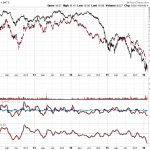Business decision-making is slowing down, according to a recent article by Tom Monahan. He documents slower sales cycles, slower decisions in hiring, slower implementation of IT projects, with reasons that include larger companies, more attention to risk and over-collaboration. Monahan talks of the cost, but he doesn’t spend much time on the scariest part of the story: slow is risky.
The essence of business is laying out cash today—for capital, labor, materials—and receiving revenue sometime in the future. The challenge is that plenty of unexpected changes can intervene before the revenue is in the bank. The economy might go into recession despite President Trump’s best efforts. Technology can make your product or service as obsolete as a travel agent. Attitudes can change so that your product is treated like a Chipotle burrito. People from the government can show up to help you. And a new competitor can drive up in an Uber.
The faster your business acts, the less risk you have from unforeseen events.

One valuable process to speed up is the sales cycle. While courting a prospect, the economy can turn down, technology can advance, or the prospect’s own conditions can change. A faster sales cycle lowers the risk of external events sinking your sale.
Order fulfillment or product delivery can be sped up. If you are simply grabbing boxes off the shelf and shipping them to your customer, there’s not much risk of falling into a recession before the UPS pickup. But for custom products or services, time is important. The longer your typical project time, the more important it is to speed it up.
Even if your contract guarantees you payment and the customer does not have the option of backing out, you are at risk. The customer may go bankrupt and be unable to pay. More likely, if conditions go south your customer will ask for termination without full payment. Most businesses negotiate under these conditions, valuing good will with the client. However, when you have already delivered a product or service and gotten paid, there is no need for negotiation.
















Leave A Comment